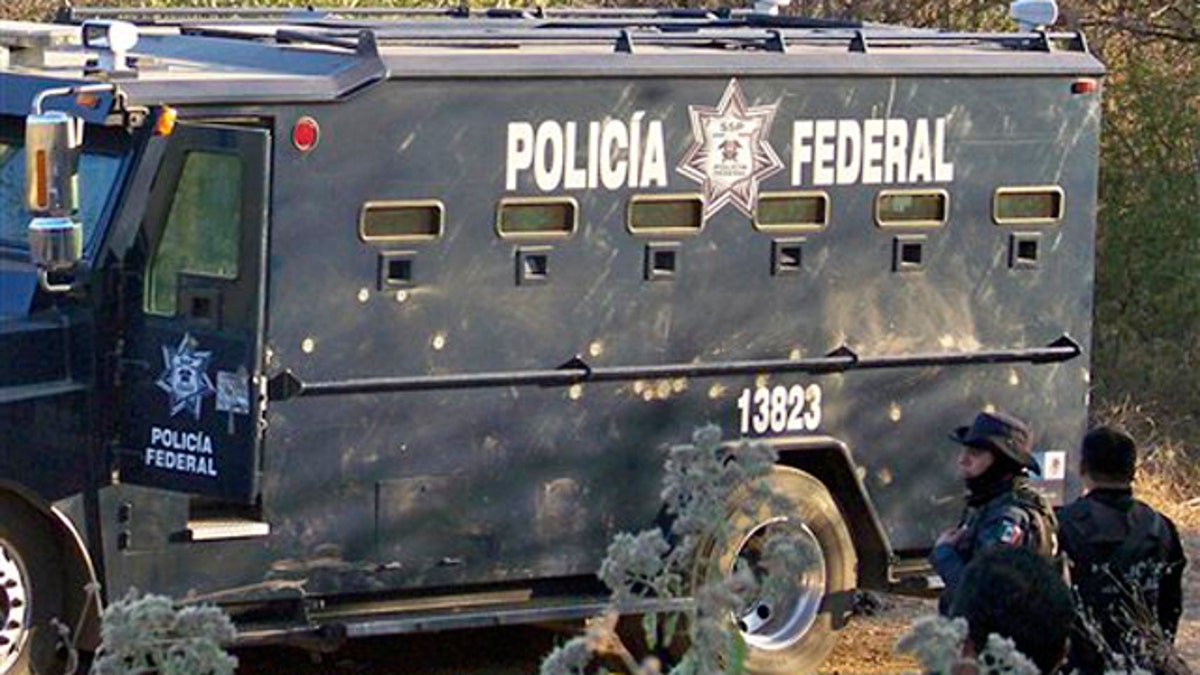
Dec. 10: Federal police agents stand next to a truck riddled with bullets in Apatzingan, Mexico. (AP)
MEXICO CITY – Mexico says more than 30,000 people have been killed in drug violence since President Felipe Calderon launched a crackdown against cartels in 2006.
Attorney General Arturo Chavez Chavez says that about 12,500 people were killed between January and November compared to 9,600 for all of 2009.
The most recent official toll of the drug war dead came in August, when the intelligence agency director said 28,000 had died.
In the border city of Ciudad Juarez, the hardest hit city by Mexico’s drug war, the year’s death toll in drug-related violence rose to 3,000 Tuesday after two men were shot dead on a street, authorities said.
Ciudad Juarez has seen its homicide rate rise to one of the highest in the world after vicious turf battles broke out between gangs representing the Juarez and Sinaloa drug cartels in 2008.
That year, 1,623 people were killed in drug-related violence, and the toll increased to 2,763 deaths in 2009.
With prosecutors' spokesman Arturo Sandoval announcing the latest grim milestone, a total of 7,386 people have died in the city of 1.3 million people across the border from El Paso, Texas, in three years. Most were members of rival drug gangs, but civilians, police and recovering drug addicts have also been targeted.
The U.S. Embassy touted Mexico's increased cooperation in anti-drug efforts, noting in a statement that on Tuesday Mexico extradited 14 suspects wanted in the United States on drug, organized crime, money laundering, weapons and homicide charges.
The extraditions "represent another victory in our joint fight against organized crime," the embassy said.
And touting Mexico's own successes in the offensive, Calderon said Tuesday that a big party led to the demise of a drug cartel chief, who was killed in a shootout with federal police.
The La Familia gang invited hundreds of people to a party last week in the western city of Apatzingan and didn't bother to keep it a secret, Calderon said in an interview with W Radio.
Federal police learned about it and the shootout broke out when they arrived to investigate, he said. The government says that La Familia leader Nazario Moreno, nicknamed "The Craziest One," was killed in battles that lasted two days and spread to key parts of Michoacan state, with gunmen blockading roads with burning vehicles.
"What happened those days is that we gave La Familia cartel the biggest blow in its history," Calderon said. "With a certain amount of insolence, they organized a party, a gathering of hundreds of their people. ... Everyone found out about the party."
The government says cartel gunmen fled with their dead during the shootouts, and Moreno's body has not been recovered.
La Familia has been the most flamboyant of Mexico's drug cartels. The gang claims it is trying to protect Michoacan — Calderon's home state — from other cartels and common criminals, a message it touts in banners and even in occasional interviews with the news media.
The gang has not bothered to lower its profile since Moreno's reported death. Sympathizers — some with small children — have marched repeatedly in Apatzingan and the state capital of Morelia, carrying signs supporting the capo and demanding the withdrawal of federal forces.
On Tuesday, the Interior Department issued a statement saying such demonstrations show only the cartels' "incipient penetration of some local sectors, but not any social support for crime and its tactics."
Later, in a rare joint statement, federal police, prosecutors, the army and navy urged all three levels of government — local, state and federal — and all three branches of government to work together against drug cartels.
The statement said La Familia members "are nothing more than criminals whose only intention is to terrorize and attack society."
"Far from protecting Michoacan residents from crime, they deeply hurt them. They commit murders, extortion and kidnappings," the statement added.
Moreno, 40, the dead drug lord, was considered the ideological leader of La Familia, setting a code of conduct for members that prohibits using hard drugs or dealing them within Mexican territory.
He reputedly handed out Bibles and money to the poor, and wrote a religiously tinged book of values for the cartel, sometimes known as "The Sayings of the Craziest One."
The gang, specializing in methamphetamine, is also known as one of Mexico's most vicious. La Familia emerged as an independent organization in 2006, announcing its split from the Gulf cartel when it rolled five severed heads into a nightclub in the city of Uruapan.
Soon afterward, Calderon deployed thousands of federal troops and soldiers into Michoacan, a crackdown he quickly extended to other cartel strongholds in northern and western Mexico. Several top drug lords have been brought down but gang violence has soared to unprecedented levels, claiming more than 28,000 lives in four years.
"I'm a Michoacano and the situation of the state hurts," Calderon said. "We cannot allow the law of a cartel to rule a state."







































